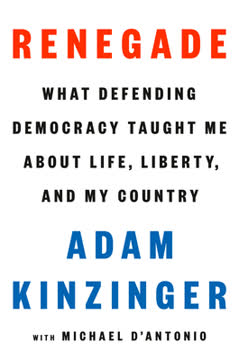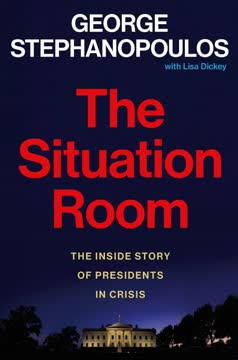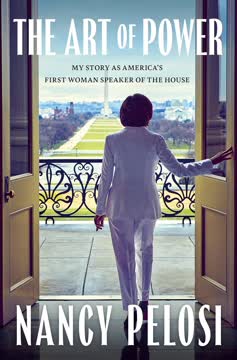Key Takeaways
1. From Midwestern Idealism to Military Resolve
I stand for the values I learned in my formative years, before Trump and, for that matter, before conservatism and the GOP began its slide away from policies and toward gaining power at any cost.
Early foundations. Adam Kinzinger's journey began in the stable, secure environment of Bloomington, Illinois, where his parents instilled values of decency, hard work, and faith. His early political interest, sparked by local campaigns and Ronald Reagan's presidency, was rooted in an idealism that saw politics as a means of service and making things better for others, rather than a battleground. This upbringing fostered a moderate conservatism, open to respectful dialogue and focused on community needs.
Life-altering events. The 9/11 terrorist attacks profoundly shifted Kinzinger's perspective, transforming his long-held interest in military aviation into a fervent desire to serve his country in a time of war. His Air Force training, from the demanding Officer Training School to mastering complex refueling jets, instilled discipline, camaraderie, and a calm resolve in the face of danger. A near-fatal solo flight and a real-life confrontation with a knife-wielding assailant further honed his ability to act decisively under pressure, proving his capacity for courage and self-defense.
Global perspective. Overseas deployments to places like Guam, Turkey, and Colombia broadened Kinzinger's understanding of America's global role, from supporting allies and maintaining trade routes to combating drug cartels and terrorism. These experiences, including the rigorous SERE (Survival, Evasion, Resistance, and Escape) training, deepened his appreciation for the military's ethical standards and competence, while also exposing him to the complexities of international relations and the impact of American foreign policy on diverse cultures.
2. The GOP's Descent into Hyperpartisanship
No one said much about how the corruption of power we Republicans saw in the Democrats (power generally begets corruption) was likely to affect us too.
Erosion of comity. Kinzinger's early political career, including his election to the McLean County Board at age 20, was marked by cordiality and a focus on local issues. However, as he ascended to national politics, he witnessed a gradual but profound shift within the Republican Party, moving away from Reagan's spirit of bipartisan compromise towards an increasingly combative and power-hungry approach. This change, often disguised by continued reverence for Reagan, masked a growing rage at being in the minority and a willingness to abandon traditional decency for political gain.
Tea Party's influence. The rise of the Tea Party movement in 2009, fueled by anxieties over the economy and Obamacare, further accelerated this trend. While Kinzinger initially found common ground with their anti-spending agenda, he grew concerned by the movement's embrace of extreme rhetoric, conspiracy theories (birtherism, Agenda 21), and a tendency to disrupt public discourse. He observed how figures like Michele Bachmann and organizations like FreedomWorks leveraged the movement's energy for personal ambition and to push the GOP further to the right, often at the expense of policy and thoughtful debate.
Internal divisions. The party's internal struggles became evident in the increasing number of "insurgents" who prioritized ideological purity and obstruction over compromise. Kinzinger saw colleagues like Jim Jordan, Raúl Labrador, and Mick Mulvaney gain prominence by adopting aggressive, uncompromising stances, often targeting their own party's leadership. This internal conflict, coupled with the growing influence of media personalities who demonized opponents, created an environment where loyalty to a partisan agenda superseded duty to country, setting the stage for future crises.
3. The Corrosive Influence of Media and Conspiracy
Why would anyone believe that Democrats want to make allies of Islamofascists or that the ACLU is a terrorist organization? The evidence for these allegations was so lacking that some who tuned in were skeptical.
The media echo chamber. Kinzinger observed how conservative media outlets, particularly Fox News and talk radio hosts like Rush Limbaugh and Sean Hannity, played a pivotal role in shaping public opinion and fueling partisan division. These platforms, often prioritizing entertainment and "adrenaline rushes" over factual reporting, created an echo chamber where wild claims and conspiracy theories flourished. This constant barrage of fear-mongering and distortion led many constituents to distrust traditional news sources and rely solely on partisan narratives.
Conspiracy theories proliferate. The book highlights the proliferation of outlandish conspiracy theories, from "birtherism" questioning Obama's legitimacy to the UN's "Agenda 21" plot for world domination and "black helicopters" signaling an impending takeover. Kinzinger found that these claims, often debunked by facts, were deeply entrenched in the minds of many voters, making rational debate nearly impossible. This erosion of trust in experts, science, and institutions was actively encouraged by political operatives and lobbyists, further polarizing the electorate.
Weaponizing outrage. The media's role in amplifying outrage and demonizing political opponents became a powerful tool for mobilizing the base. Kinzinger noted how Democrats were often labeled "San Francisco-style" extremists, while any deviation from party orthodoxy was met with accusations of being a "RINO" (Republican In Name Only). This constant state of moral warfare, where opponents were cast as "evil" or "Satan's minions," created a climate of intense animosity, making compromise seem like a betrayal rather than a necessary function of governance.
4. Trump's Rise: A Cult of Personality Seizes the Party
I knew I was witnessing the first cult of personality to ever seize control of a major party, and the humiliation of a senator who was one of the worst people to occupy the Senate since Republican Joe McCarthy of Wisconsin, who ruined many lives with his witch hunt of the 1950s.
The showman's appeal. Donald Trump's entry into the 2016 presidential race marked a turning point, as his reality TV persona and unapologetic use of insults and nicknames captivated media attention. Kinzinger, initially supporting Jeb Bush, witnessed how Trump's "demonic cheerleader" charisma established a powerful hold on a segment of the electorate, turning political rallies into entertainment spectacles. This approach, prioritizing performance over policy, effectively neutralized his opponents and solidified his base.
Party capitulation. The Republican Party, including many members Kinzinger respected, rapidly converted to Trump's political cult. Figures like Billy Long, who once championed specific policy issues, abandoned their principles to align with Trump, fearing his ruthless wielding of power and punishment for disloyalty. This shift was evident at the 2016 Republican National Convention, where long-standing platform positions were altered to benefit Trump, and chants of "Lock her up!" became a recurring theme, signaling a new era of uncritical loyalty.
Disregard for norms. Trump's presidency was characterized by a chaotic governing style, a constant stream of lies and distractions, and a profound disregard for democratic norms and institutions. Kinzinger was appalled by Trump's attacks on NATO, his embrace of Vladimir Putin despite evidence of Russian election interference, and his willingness to sacrifice American interests for personal gain, as seen in the ZTE controversy and his betrayal of the Kurds in Syria. This behavior, which Kinzinger described as "puzzling, deluded, self-indulgent, and cruel," created a climate of instability and eroded trust in government.
5. The January 6th Insurrection: A Deliberate Dereliction of Duty
Sadly, yesterday it became evident that the president has not only abdicated his duty to protect the American people and the people’s house, he invoked and inflamed passion and he gave fuel to the insurrection that we saw here.
The Big Lie's culmination. The January 6th attack on the Capitol was the direct result of Trump's relentless campaign to spread the "Big Lie" of a stolen election, despite overwhelming evidence to the contrary. Kinzinger recounts how Trump's allies, including Rick Perry and Donald Trump Jr., explored "aggressive strategies" to overturn the election, culminating in John Eastman's theory that Vice President Mike Pence could unilaterally reject electoral votes. This scheme, embraced by over a hundred Republican members of Congress, raised false hopes among Trump's followers, priming them for action.
Incitement to violence. Kinzinger, forewarned by Chris Krebs of impending violence, witnessed firsthand the unfolding chaos. Trump's rally speech, urging protesters to "fight like hell" and promising to join them at the Capitol, directly incited the mob. The subsequent 187-minute gap, during which Trump watched the violence unfold on television and refused to intervene despite pleas from his family and allies, constituted a profound "dereliction of duty." This inaction, coupled with his active refusal to mobilize the National Guard, demonstrated his complicity in the attack.
A medieval battle. The scene at the Capitol was one of "American carnage," with civilians in tactical gear waging a "medieval battle" against outnumbered police officers. Kinzinger describes the shock and horror of seeing the building overrun, the violence, and the death of Ashli Babbitt. Even after being forced to flee for their lives, many Republican members of Congress, including Kevin McCarthy, returned to the chamber to vote against certifying election results, prioritizing loyalty to Trump over their constitutional duty and the truth.
6. Choosing Truth: The Cost of Defying a Demagogue
After all, losing a job is nothing compared to losing your life.
The call for accountability. In the immediate aftermath of January 6th, Kinzinger became the first Republican to call for Trump's removal from office via the Twenty-Fifth Amendment, a decision he knew would invite the wrath of Trump's base. This act of defiance, followed by his vote to impeach Trump for "incitement of insurrection," marked him as a "renegade" within his party. He was joined by nine other House Republicans, forming the largest group from a president's party ever to vote for his impeachment.
Personal and political ostracization. The consequences were swift and severe. Kinzinger faced intense backlash from across the country and within his district, receiving threatening letters, including one to his wife, Sofia, that called him a "disappointment to God" and accused him of joining the "devil's army." He was censured by his state party, challenged in the primary, and shunned by former colleagues who literally turned their backs on him. This hostility ultimately led him to announce he would not seek reelection, recognizing that the party had abandoned traditional conservatives like him.
A broader battlefield. Despite the personal cost, Kinzinger remained committed to fighting for democracy. He saw his decision not to seek reelection as a shift to a "broader battlefield," where he could continue to advocate for truth and accountability outside the confines of Congress. His efforts included the formation of "Country First," an organization aimed at supporting mainstream politics and pro-democracy candidates, recognizing the need for a principled stand against extremism.
7. Unveiling the Truth: The January 6th Committee's Mission
Although she was unyielding in her comments about the investigation, Cheney showed a soft side in dealing with the honest and therefore risk-taking witnesses, especially after sessions were gaveled closed.
A bipartisan effort. Kinzinger's appointment to the House Select Committee to Investigate the January 6th Attack on the United States Capitol, alongside Liz Cheney, was a crucial step in the effort to establish a permanent record of the events. Despite Speaker Pelosi's initial pledge of non-involvement, her influence was felt, but the committee's diverse membership, including lawyers and military veterans, worked to overcome internal friction and focus on the central issue of the coup attempt. Kinzinger developed a strong working relationship with colleagues like Adam Schiff, finding common ground in their shared commitment to the investigation.
Meticulous investigation. The committee undertook a massive investigative effort, amassing over a thousand interviews, a million documents, and hundreds of hours of video footage. Kinzinger highlights the use of data management techniques, including Denver Riggleman's efforts to analyze phone records, to piece together the intricate web of communications and actions leading up to and during the attack. This meticulous approach aimed to leave "no doubt about the who, what, how, and why things happened as they did."
Compelling public hearings. The committee's public hearings, structured as a "must-watch limited series," were designed to present the evidence in an engaging and accessible manner to the American people. Kinzinger, co-chairing the fifth and eighth hearings, focused on Trump's attempts to corrupt the Justice Department and his 187-minute dereliction of duty. Witnesses, categorized as "Trump-infected zombies," "partial zombies," and "truth-tellers," provided damning testimony, revealing the extent of the former president's scheming and the courage of those who resisted him.
8. The Enduring Threat to Democracy and the Call for Accountability
Tyranny, like hell, is not easily conquered. But we have this saving consolation: The more difficult the struggle, the more glorious in the end will be our victory.
Trump's unrepentant defiance. Despite the overwhelming evidence presented by the committee and the Senate impeachment trial, Trump remained unrepentant, continuing to spread the "Big Lie" and rally his followers. His allies in Congress, including Kevin McCarthy, quickly abandoned their initial outrage, downplaying the severity of the attack and even declaring it "legitimate political discourse." This collective amnesia and continued loyalty to Trump underscored the deep-seated nature of the threat to democratic norms.
The struggle for justice. The book details the challenges of holding Trump accountable, from the Senate's failure to convict him due to political maneuvering by Mitch McConnell to the fizzling of a proposed bipartisan commission. Kinzinger notes the hypocrisy of McConnell's scathing condemnation of Trump's actions while simultaneously voting to acquit him. This political calculus, prioritizing party power over constitutional duty, left many feeling that justice was elusive and that the system was rigged against accountability.
A future of vigilance. Kinzinger concludes with a stark warning about the enduring threat to American democracy, emphasizing that the January 6th attack was not an isolated incident but the culmination of decades of escalating extremism and division. He stresses the importance of integrity, courage, and a commitment to "Country First" for all leaders. His work on the committee and his continued advocacy are a call to action, urging citizens to remain vigilant and actively participate in safeguarding the nation's democratic principles against those who would undermine them for personal power.
Last updated:
Review Summary
Renegade received mostly positive reviews, with readers praising Kinzinger's courage and integrity in standing up to Trump and the GOP. Many appreciated his insider perspective on recent political events, particularly the January 6th insurrection. Some readers found the book well-written and engaging, while others felt it was self-aggrandizing or focused too much on his military career. Despite disagreements on policy issues, many reviewers respected Kinzinger's commitment to democracy and willingness to sacrifice his political career for his principles.
Similar Books
Download PDF
Download EPUB
.epub digital book format is ideal for reading ebooks on phones, tablets, and e-readers.








